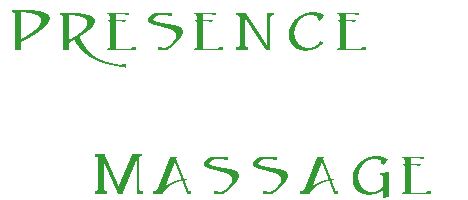Focus on the Tender Parts
with Hypnotherapy
by Shiva Reinhardt
What exactly is hypnotherapy? I think I have a pretty good idea of what hypnosis is: when somebody up on stages says, "You're getting sleepy! You will listen to me!" in a monotone singsong voice and pretty soon lots of people are jumping around quacking like ducks and the audience is laughing. But how do you use that for therapy? Before I'd heard anything about it besides that it can help you quit smoking I just figured it was telling your subconscious mind what to do: "You are getting sleepy! You will never want a cigarette again!" But that's not therapy. That's just telling yourself what to do. Ultimately the underlying urge is still there, and is probably coming out in other ways, which may or may not be as pleasing to you as smoking. Nevertheless, the energy hasn't been recognized and integrated; it's just been diverted.
As a therapist and a woman going through my own healing process, that kind of therapy doesn't really appeal to me. I don't want to reprogram myself that way. I am mildly interested in Neuro-Linguistic Programming, because it seems promising, but I remain skeptical. We are running programs in our brain and it seems to me that it'd be a good idea to make those more conscious, if we have to have them. My ideal would be to get rid of all the programs. I don't know if we're wired for that. Maybe that's what death is. I really think that even so-called enlightened people are still running programs. It's just a REALLY GREAT program.
Hypnotherapy, as I've come to see it, is different from what I've described. In fact, my teacher calls it "Presence Centered Hypnotherapy Counseling," to differentiate it from "quit-biting-my-nails-hypnotherapy." Plenty of people are doing this more expanded kind of hypnotherapy, sometimes calling it "transpersonal" or "spiritual" and each has his own twist on it, I'm sure. Here's what I'd call it:
Meditative Self-Counseling with Witness
Maybe that's not very catchy, though.
What happens in a hypnotherapy session with me is something like meditation with invitations to feel and express, and I'm there to basically hear you, support you, witness you, offer words to you, and listen. For 15 minutes I'll guide you into a present, relaxed, aware, meditative state. Then you can do whatever you want! Ha! Most people coming for help don't want that kind of freedom. As a client, I want help. I want my therapist to tell me what I'm missing and how to fix it. This approach is different.
When we become truly relaxed and aware, we either experience peace, love, and joy (or whatever your version of "the best experience" is), or we experience what is blocking us from it. We are truly our own best healers. I could go to a therapist and have her tell me what she thinks. But that won't be as good as my own innate wisdom. The problem is really having the support to go with it, really respecting ourselves enough to trust that following our hearts is what will heal us. Our own innate wisdom is working all the time, and we're (a lot of us, but not all. I speak in generalizations, excuse me) riding the brake. To follow my sorrow, or my fear, or my resistance can be difficult and downright uncomfortable.
In hypnotherapy as I envision it (and this article serves many purposes: to help me articulate myself; to educate those who think hypnosis=quacking; to tell you about what I offer; and food for thought for therapists) the therapist serves as a catalyst, truly a helper. I see the therapist being there to point out things. In our emotional drama, we sometimes get caught up, as clients. The therapist is there to say, "Yeah, that was intense, and important to experience. Can you notice how you might feel different now from a few minutes ago?"
Perhaps I'm talking only about myself. I have only my own experience as a client to go on. I've been a therapist to others and watched clients go through sessions with other therapists. But I can't know exactly what they gained from it. I know that what I gained most from my therapists was them pointing out what was already there but I failed to notice fully. Whether it was my pain or joy, noticing it more always brought me closer to the truth and closer to myself.
After15 minutes of guided meditation, the client is ready to engage in the therapeutic process. As a therapist, I encourage them to talk about, or bring into consciousness, what is they want to work with, which may have been decided earlier or may be something that is coming up in the present moment. At this point the client may talk, they may go directly into an emotional experience, or any number of things can happen.
What the therapist does at this moment is simply support the client. This can be done by directing the client to what is happening in his own experience, and usually is. It can also be done by asking appropriate questions, or using specific tools, yet always minimally. I've seen incredible sessions happen where the therapist barely did anything except say "Uh huh," and "Yeah," and "What's happening for you now?" at the right times and with real presence and interest.
Someone skilled in hypnotherapy, to me, can speak in a way which invites people into a present, meditative, aware state. She can listen with incredible intensity, and she can skillfully insert questions or statements, with the capacity to be totally off base and carry on business as usual.
The therapist doesn't have to be right. This was something it's really taken me some time to get while I've been studying therapy. Isn't the therapist supposed to be something like God? Doesn't the therapist have all the answers? I'd never been to therapy before my formal training, so I really had no idea, but this was what was in my head. When I saw my teacher make a mistake in guessing what was happening in the client's experience, I expected him to apologize profusely. But what happened?
"So what are you experiencing?" he said, without missing a beat, with no regret, and most importantly no focus on himself. What happens when someone starts apologizing and freaking out about anything? Focus goes on them. What if the client has to come out of their own experience to say "No, it's ok. I was just feeling a little more sad than angry."? Suddenly, the client is feeling bad that the therapist started feeling bad! Talk about adding layers.
As I see it, hypnotherapy is a great way for clients to get in touch with themselves cleanly. There will always be some amount of interference from the therapist. Usually, it's well worth it because as clients we are so used to directing attention away from our tender parts that we need that kind of support, even if it's not totally perfect. The reason hypnotherapy is different from normal therapy is that it doesn't suppose that the therapist knows best: We don't have to be perfect! (We're not even therapists, really. Just hypnotists!) Moreover, it trusts the client's own process over anything else. I trust the client's own process over anything, and in my hypnotherapy sessions that will be self-evident.
I will support you to touch your own tender spots, those spots that want to be touched more than anything, yet we try to protect and cover as if our lives depended on it. Right now take a moment to breathe into your heart space and feel that tender spot, whether it means thinking about someone you love, how you've been hurt, or the incredible vulnerability of the human condition. That tender place is so valuable, and ultimately, though it may feel pain sometimes, it can never be truly tarnished. It is the diamond light within us all.
Email me at shivashiva@myway.com
This webpage is still under construction. Check back frequently or email me.

